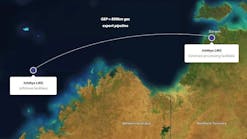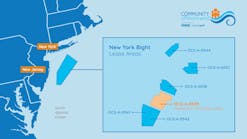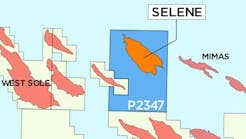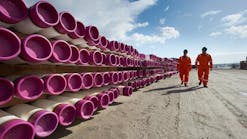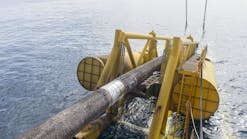Finland's recent entry into the European Union has added credence to Finnload's ambition of becoming the logistics gateway for goods to and from the Former Soviet Union.
The EU is keen to build trade relations with the countries of Eastern Europe. Finnload, a consortium of 12 Finnish forwarding, transportation, and distribution companies, has been doing this for some time anyway. The group offers conveyance of goods by air, sea, land, and rail, as well as warehousing and postal services, through its newest member, Finland Post.
The member companies have built up special relations with Russia, derived from the country's historical association with Finland. From the offshore oil industry's point of view, this should facilitate transportation through Russia's notorious network of bureaucracy, once the White Sea, Barents, and Pechora Sea developments get under way.
Geographically, Finland is in a favoured position as the only EU country bordering Russia - 1,200 km of it. Finland's infrastructure matches the highest western standards, through long membership of the trade association EFTA, and it already operates trade agreements with Russia and the Baltic states, as well as the Nordic countries.
Finnload has several other advantages over other transportation groups serving the Russian market. The truck drivers of its member companies are used to travelling long distances into Russia: hi-tech surveillance methods are used to keep track of these vehicles. And sharing a similar climate in Finland, these drivers are used to the harsh winter conditions of the inner FSU.
Road-conveyed goods traffic can also pass more quickly through Finland to Russia. Alternative road routes through central Europe have experienced a sharp jump in traffic recently.
There are also numerous borders for goods to pass through on their way to Moscow, and some countries on the way such as Austria and Switzerland are starting to take action to limit HGV transit traffic. Turkey is another option, but the process of conveyance can be slow here too, with some of the through roads in need of improvement.
On the minus side for Finland, cargo transit traffic through the Finnish border town of Vaalimaa has risen substantially since September 1993, leading to long lines of traffic waiting to cross into Russia. However, the Finns are now building a big new customs post on the border which they hope to operate jointly with the Russians.
Few other nations can do this, according to Finnload's UK representative Harley Atherton. This capability has led to Korean and Taiwanese companies routing their consignments to Russia through Finland.
"It actually works out better for them," he says.
As goods traffic increases to St Petersburg in particular (this is Russia's largest and most accessible northern port), finding enough warehousing space in Russia, or attendant insurance, is becoming a problem. It can work out cheaper to keep consignments stashed in Finnish warehouses, another service offered by Finnload. The group can also ensure that goods actually leave St Petersburg, through its familiarity with the workings of Russian officialdom.
Having been part of Russia until 1917, Finland is the only country that shares its railway gauge size. This presents a big advantage for waggon loading to Steveco, one of the member companies of Finnload.
The Finn-load group hopes Finland will develop into The Netherlands of Northeast Europe/the Arctic region. Although not as big as Rotterdam, ports such as Pori and Kotke can handle vessels up to 100,000 tonnes - the only ports that can do this in the eastern Baltic.
Steveco has already supplied oil companies working in Siberia, notably Conoco, through consignments such as drilling equipment, pumps, motors and accommodation cabins. In future, says a senior Steveco director, the company expects to sign more contracts with western oil companies "in a really big way".
The company could also ship parts to oil and gas developments on the Black Sea and Caspian Sea via the Volga River, he claims, as well as hazardous liquids, LPG and propane using the FSU's rail system.
Copyright 1995 Offshore. All Rights Reserved.
